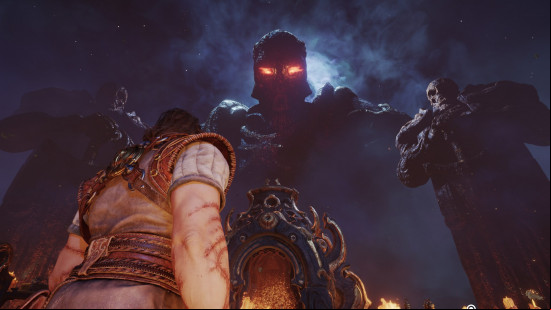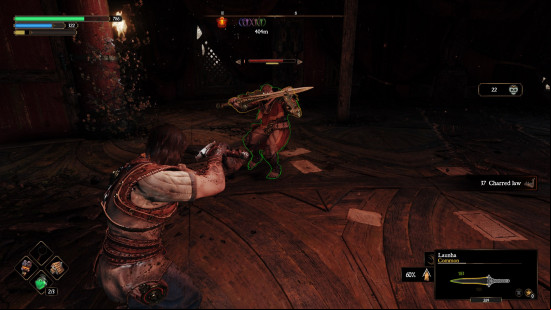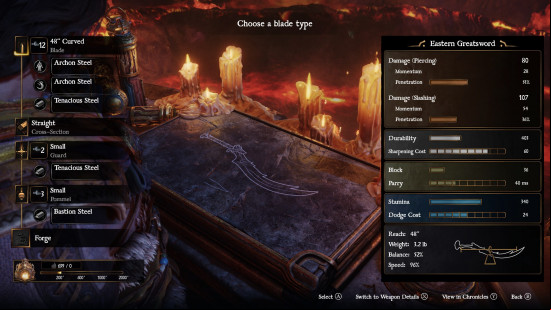Verdict
With its weapon-building systems and deliberate, targeted combat, Blades of Fire has a lot of fresh-feeling ideas. Its control scheme is strange and will force you to press each button with care. Its granular forging system makes you consider every weapon in your arsenal. But however differently it approaches them, the game only offers the same thrills as other action games of its ilk. Blades of Fire feels unique, but just can’t get weird enough.
The creators of Blades of Fire have played a lot of videogames. Developer Mercurysteam has spent a decade-plus working on classic series like Castlevania and Metroid. As might befit that pedigree, its latest effort is a bone-deep rethinking of action RPG trends. From moment to moment, Blades of Fire plays unlike anything else. The God of War and Dark Souls influence is apparent, but the game also has subtler inspirations. The swinging positionality of The Legend of Zelda: Skyward Sword, for one, and the gonzo action and stilted earnestness of Dragon's Dogma for another. In an era of perfunctory crafting systems, Blades of Fire's crafting alters every swing of every sword. However, despite its relentless cleverness, it can't help but feel mundane and overdrawn. It lacks the verve of the genre's best because it is so focused on its influences, resulting in a game that can feel lifeless and self-conscious. Blades of Fire might be a weird original, but it's never quite weird enough.
On paper, Blades of Fire couldn't be more typical. Protagonist Aran de Lira is a tough, gruff, and capable man. His family is dead. He lives alone on the edge of an oppressive kingdom, whose evil queen (also Aran's childhood friend) turned all steel into stone, obliterating any challenge to her realm. When an old friend gives him one of the hammers that forged the world – allowing Aran to build an arsenal of steel weapons – he travels to end the queen's reign once and for all, with the help of the puckish student Adso. For the most part, your adventure goes how you'd expect, with powerful foes to best, ancient mysteries to solve, and dank dungeons to explore.

Blades of Fire's first gimmick is its forging system. You make every weapon from relative scratch, customizing each aspect of its construction, like the form of a sword's crossguard or the length of a spear's staff. Enemies drop magical items that temper the steel and wood you use to construct your weapons, making them better at blocking damage, piercing armor, or enduring as many fights as possible. Each variable changes the weapon, some by a little and some by a lot. No single one is good at everything, so you'll have to craft to suit individual encounters or specific enemies. Unlike some of its RPG inspirations, Blades of Fire has no stat-based builds. You might develop favorites, but you'll inevitably have to use multiple weapon types to progress.
As for combat, it features some novel ideas. While this is an action game at its heart, there are no real combos (though some attacks flow better together than others). Instead, you'll pick the direction of your swings. Each weapon also bludgeons, pierces, or slashes foes, and these different damage types will be better (or worse) at hurting specific combatants. You can also swap between using a weapon's blade or point. Slashes might help you better handle multiple swarming zombies, while stabbing could pierce a knight's heavy armor. This system is the game's biggest asset. The control scheme is unfamiliar enough that your muscle memory from other action RPGs is mostly useless. Enemy weaknesses and weak points also force you to pay attention and swap weapons, even in the heat of battle.

Adso will be your constant companion throughout, though you can send him back to camp if he annoys you. He is quite helpful, even if he's useless in combat. Instead, he takes notes, detailing strategies to best enemies. Your relationship with Adso and his role as a helper closely models Atreus in 2018's God of War reboot, but with a key difference: they have no history together. Most of their dialogue can trigger at one of multiple points, so their relationship has to remain somewhat static, meaning their dynamic lacks tension. I'm not saying their relationship has to be hostile, and they're more richly explored in cutscenes, but the game's structure makes it difficult for them to have an arc together. The fact that you can send him back to camp for extended periods underlines this. The game isn't confident enough to invest in him.
These issues extend to Blades of Fire's tone and setting. Generously, it feels like a Grimm fairy tale. The characters are broad legends. The lands they wander are old (and usually some variety of haunted). But it features a gentleness and a sense of humor. It bears a goofy grin, before it bares its fangs. In practice, however, it can feel like a Dreamworks cartoon with blood and guts. The effect is less the campfire chill of a good, brutal tale and more the muddled fantasy novel your friend in high school was writing. It's enthusiastic and earnest, even charming, but is ultimately juvenile.

Blades of Fire's world is dense, even if it often feels small. Some complain about the backtracking in Metroid, but every time you return to an old area in those games, your means of traversal will have expanded. Blades of Fire is packed with secrets, and it gives you free rein to explore at your leisure, but it regularly fails to surprise.
It's also a very long game. I played nearly 20 hours before leaving its first map. This does give Aran's journey a truly titanic scale, but it incorrectly assumes that its sometimes-exhilarating, often one-note combat is enough to sustain it over dozens of hours. So many of Blades of Fire's enemies are basic reskins, even within the first few areas. Once you have an enemy's attack patterns down, it becomes a chore to fight them time and again.

Blades of Fire is therefore best played at a leisurely pace, just like how an epic fantasy novel is best read. You should play it enough that you maintain muscle memory, but not so much as to burn yourself out on it. Still, I'm not convinced that playing it over a longer period would alleviate my frustrations. Even its title is staggeringly unevocative. Blades of Fire cannot be described cleanly as derivative, but it only approaches the same feeling I get from other games of its kind from a new angle. I want more from a game that demands so much of my time.
